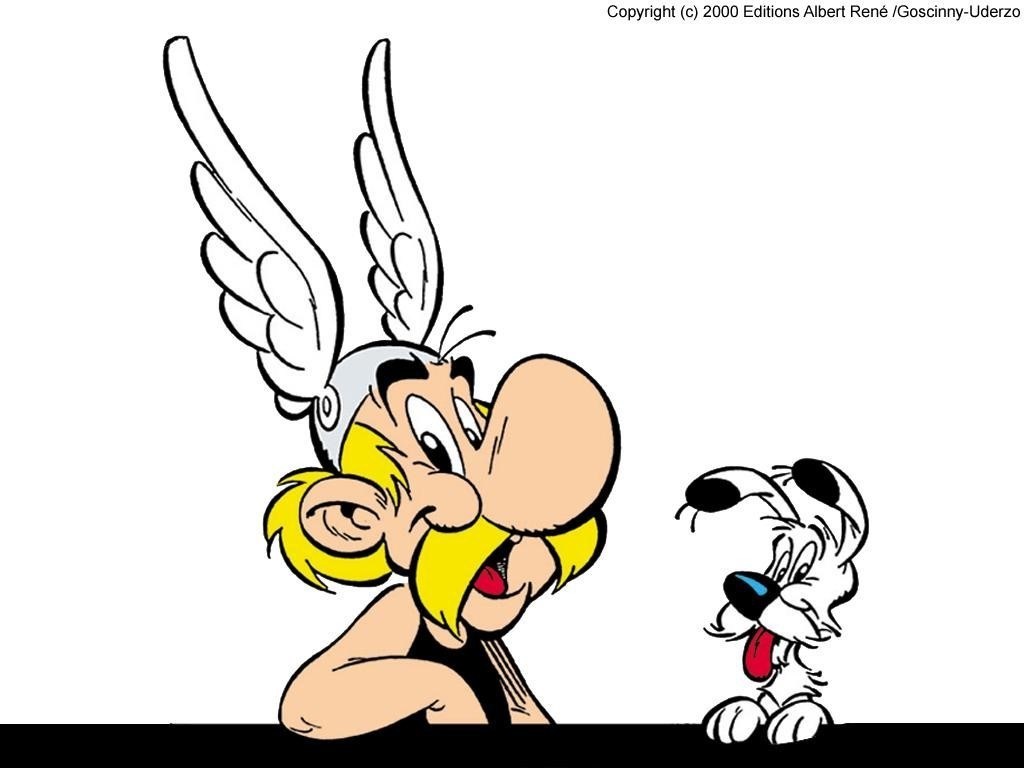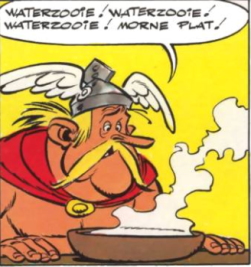
posted by Catriona Seth
If we were playing a word association game and I said ‘Eiffel Tower’, chances are you would answer ‘Paris’. If I mentioned a village in Gaul which is heroically resisting Roman rule, I surely would need to go no further: menhirs and magic potion would instantly come to your mind and you would answer ‘Asterix’. You would be right. The diminutive Gaul’s adventures have been enchanting French children since 1959. He was the brainchild of René Goscinny (1926-77) and Albert Uderzo (born in 1927). There have been 36 albums up to and including Le Papyrus de César in 2015, and every time a new one comes out, there is great rejoicing amongst readers of French, young and old.
The Asterix books have been translated into more than a hundred languages. You may well have read them in English. If you have, I am sure you will join me in celebrating the great art of Anthea Bell and Derek Hockridge who translated them. As bilingual children, my sister and I read Asterix both in English and in French with the same pleasure, and thinking about what made the books funny was one of the ways I got interested in languages. Take the names of the main characters which play on words. It is easy to go from ‘un astérisque’ (the typographical star sign: *) to ‘an asterisk’ and the name of Astérix/Asterix, or to see that ‘un obélisque’ or ‘an obelisk’ gives us Obélix/Obelix, but such obvious translations do not always work. ‘Dogmatix’ is a brilliant name for the little dog, but if you look at the French version, you will find he is called ‘Idéfix’. His English name is, if anything, better than the original, since it keeps the idea that because of his instinct he is rather single-minded which someone who has an ‘idée fixe’ would be (someone ‘dogmatique’ or ‘dogmatic’—the word is the same in French and in English—is unwavering in the conviction that he or she is right or is very set on following a dogma). There is also the added play on words with ‘dog’.
If you read the names of the characters or the places out loud in the original, you will see they are often typical French phrases. The poor old bard who always gets tied up is ‘Assurancetourix’ (an ‘assurance tous risques’ is a comprehensive insurance) and the village elder is ‘Agecanonix’ (to attain ‘un âge canonique’ is to reach a great age). One of the Roman camps is called ‘Babaorum’ (‘un baba au rhum’ is a rhum baba). There are dozens of other fun examples.
Because the Asterix books rely so much on wordplay, it is often difficult to get the same joke in two different languages. Sometimes the translators slip in a pun which is not in the original. I seem to remember an exchange at a banquet in which one character says to the other ‘Pass me the celt’ (for ‘the salt’) and another observes ‘It must be his gall bladder’ with the gall/Gaul homophone providing the joke. This is to make up for the fact that some French puns quite simply cannot be translated.
Beyond the linguistic transfer, there is cultural transfer at work in the English versions of the albums. Preparing a paper for a conference to mark the bicentenary of the battle of Waterloo last year, I remembered that in Astérix chez les Belges, before the battle, a warrior, who lives in hope, asks his wife whether he will get potatoes in oil (i.e. chips, the famous Belgian ‘frites’) for his meal. She serves up another justly famous Belgian speciality, a sort of enriched chicken and vegetable stew, called waterzooi (there is usually no final ‘e’). The feisty Belgian looks at the dish and sighs ‘Waterzooie! Waterzooie! Waterzooie! morne plat !’

For the record, it is absolutely delicious and anything but dreary as the photograph shows.

The Belgian warrior’s crestfallen rejoinder is a cue for many a cultured Francophone reader to burst out laughing. Why? Because amongst the most celebrated literary evocations of Waterloo—probably the most famous battle ever fought on Belgian soil—is Victor Hugo’s poem ‘L’Expiation’ which contains the line ‘Waterloo! Waterloo! Waterloo! morne plaine !’ The dish set in front of the hungry Belgian and which was not what he hoped for is described in such a way as to echo the dreary plain on which the armies clashed. The reference works at several levels and means you need to recognise the poem on the one hand, Belgium’s national dish on the other. Where does this leave the translators? High and dry, you might think. Clearly there is no way of producing a similar effect here.
Their solution, which I shall tell you next week, is as elegant as it is clever.

My Italian wife tells me that that, in the Italian translations, the (Ancient) Romans speak in the modern dialect of Rome. This is very amusing for Italians as that dialect is not greatly admired by non-Romans.
Thank you for that: it is good to know that translators into other languages have also managed to find ways of adding touches of local humour! I really find the English versions of Asterix extremely impressive.
My kids grew up reading different language versions of Asterix. It truly is like magic, that touches the heart of anyone who reads it.